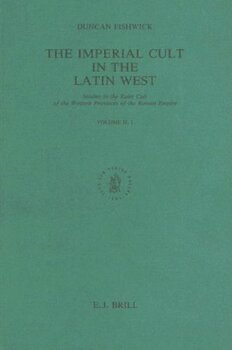
The Imperial Cult in the Latin West: Studies in the Ruler Cult of the Western Provinces of the Roman Empire, Part 2.1 (Religions in the Graeco-Roman World) PDF
305 Pages·1990·47.909 MB·English
Most books are stored in the elastic cloud where traffic is expensive. For this reason, we have a limit on daily download.
Preview The Imperial Cult in the Latin West: Studies in the Ruler Cult of the Western Provinces of the Roman Empire, Part 2.1 (Religions in the Graeco-Roman World)
Description:
Outright worship of the Roman Emperor with sacrifice, priests, altar and temple was in theory contrary to official policy in Rome. The cult of the living emperor by less direct means, however, might be achieved in various ways - the offering of cult to his companion genius or the divine numen immanent within him; the elevation of the Imperial house to a level at which it became godlike; the formal placing of the emperor on a par with the gods by making dedications to him "ut deo"; the conversion of divinities of every kind into Augustan gods that served as the Emperor's helper and protector; the creation of Augustan Blessings and Virtues that personified the qualities and benefactions of the emperor. In Volume II of "The Imperial Cult in the Latin West", Duncan Fishwick presents a series of studies that isolate these specializations of the Imperial Cult and analyze the problems they raise. In addition, an extensive monograph, which makes full use of comparative evidence from the Greek provinces, attempts a reconstruction of the liturgy and ceremonial of the western ruler cult with special reference to imperial celebrations and their associated rites and festivities.
See more
The list of books you might like
Most books are stored in the elastic cloud where traffic is expensive. For this reason, we have a limit on daily download.
